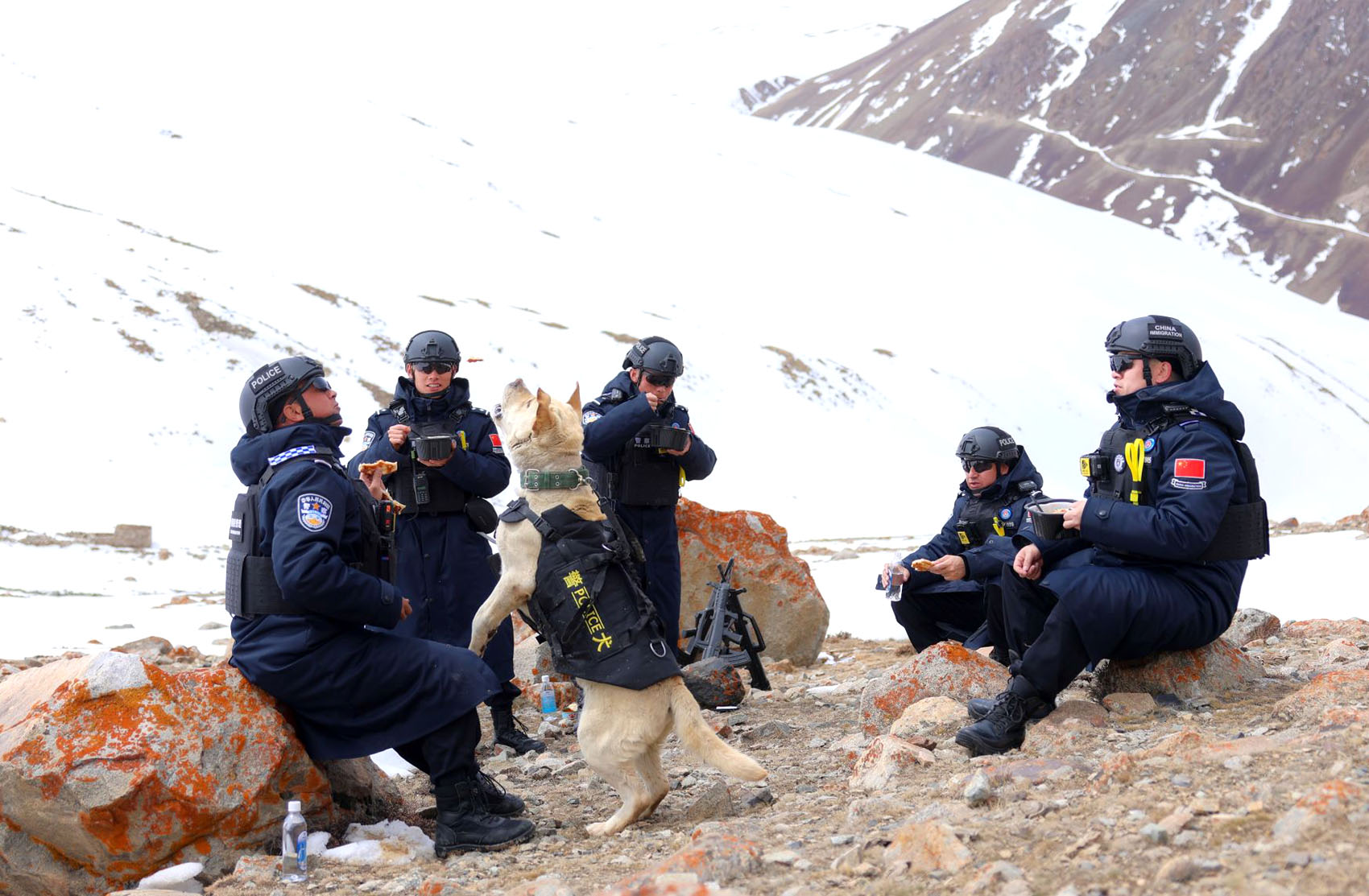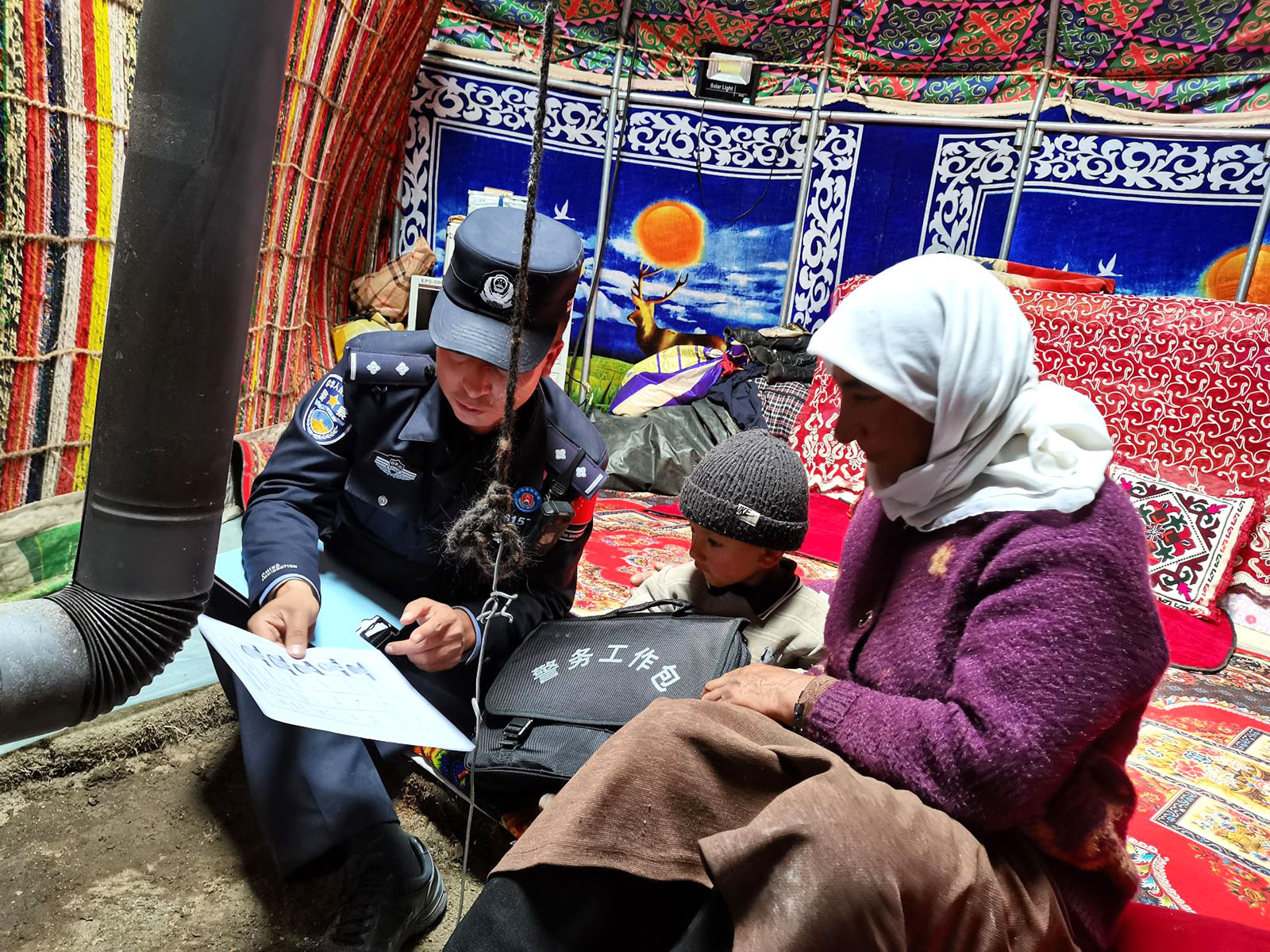Officers stationed in the Pamirs take pride in protecting borders, aiding herders

As one drives toward the Paiyike Border Police Station, they can enjoy the majestic view of snowcapped mountains.
At the foot of the mountains is a vast land filled with sand, stones or sallow grass, where yaks are occasionally seen grazing. Puddles glittering in the sun in late March served as a reminder that winter was coming to an end.
Summertime starts in May in this part of the Pamirs, when local herders travel with their livestock to pastures inside the Wakhan Corridor, a narrow valley that stretches from Afghanistan to the Tashkurgan Tajik autonomous county in China's Xinjiang Uygur autonomous region.
The Chinese side of the corridor is about 100 kilometers long and is within the precinct of the police station, whose officers patrol the section every day.
During summer patrols, police officers visit the herders' settlements in the corridor. The officers talk to them to learn about what's happening in the valley, and bring them supplies such as groceries, nang flatbread and tea leaves to help them get through the monthslong stay there.
They also leave their contact information so the herders can call in times of need.
Murat Tursun, a 31-year-old officer who has worked in the police station for more than three years, said he is touched by the hospitality of the herders.
They often insist on inviting Murat and his colleagues inside their settlements to taste their best treats, including butter, yogurt and milk tea.
The officers' workload spikes in September and October, when herders begin to take their livestock out of the corridor as winter approaches.
"We receive a lot of calls for help from them during those two months," Murat said.
The reasons for their calls vary. Some request assistance when they get a flat tire but have no spare, when their vehicles get stuck in the snow or when they have lost their cattle. The police station responds promptly to the calls by dispatching officers to the scene, he said.
A typical job is to find missing yaks for those who leave dozens of the large animals to roam in the valley for the whole summer before collecting them ahead of winter.
The officers take videos of the yaks and the vehicles they are being transported in, Murat said, adding that by watching the videos, herders who lost their yaks can determine if their animals were taken by others accidentally.
If the herders are unable to identify the animals in the videos, the officers will take extra notice during the patrols and send messages to other herders for help.

Better conditions
Paiyike is said to be a transliteration of a Kirgiz phrase, meaning "the highest mountain". The police station is located at an altitude of 3,780 meters in a village where most residents are members of the Kirgiz ethnic group.
The station sits at the eastern end of the Wakhan Corridor. Its jurisdiction borders Tajikistan, Afghanistan and Pakistan, so the police officers' daily patrols are especially important to help prevent illegal border crossings.
The patrols, which take place at an average altitude of 4,600 meters and often in howling winds and deep snow, only make the police officers' work more daunting.
"I found it particularly difficult to breathe," Murat said about the altitude sickness he endured when he first started participating in patrols. "Whenever I came back to the police station, I would feel dizzy, nauseous and extremely exhausted."
After finishing every patrol, Murat takes a two-hour break in the station's sunroom, which is filled with lush plants and equipped with an oxygen generator and a heating system. Here, officers can read books, have tea and snacks, and even sing karaoke.
The station also has a canteen, a gym and double rooms for its officers to live in. The rooms are equipped with a bathroom, a washing machine, a boiler, a TV, an oxygen generator and Wi-Fi, aiming to make the officers' lives on the plateau easier.
But things were rather different more than a decade ago.
Ablimit Awut, born and raised in Urumqi, a city more than 1,000 kilometers away, first came to work at the station for about 10 days in the winter of 2008, when he was 20.
At that time, the station was only a one-story building with a yard, and no heating or running water.
At night, Ablimit slept in a bunk bed, sharing the room with several others. "It was so windy at night, and I had to use the stove to keep warm," he said.
The water had to be fetched from a river nearby by a donkey cart. Due to the cold weather and limited water resources, he wasn't able to take a shower while working there.
"I felt the time go by so slowly. I had never experienced such hardship growing up," Ablimit said, recalling that he "almost began to cry" when he learned he would once again be appointed to work at the police station in 2012.
During his second stint at Paiyike, he lived in a double room in a new building near the one he had lived in years ago and found the conditions had "improved a bit".
A boiler was installed to provide heating, but the station still lacked stable power and water supplies.
Police officers had to save solar power while working by turning on only one of a dozen or so computers and avoiding to use electric boilers in the dorms. In addition, the water pump often failed to work in the freezing conditions.
But Ablimit said he had developed an emotional bond with the local people during his nearly two years of working there. He left after being dispatched to work in neighboring Yecheng county.
The bonds he forged were so strong that when he was up for redeployment in March 2023, he took the initiative and applied to return to Paiyike, where he was surprised by the "dramatic changes" at the station.
Sometimes, the 37-year-old still struggles with altitude sickness and feels overwhelmed when he wakes up to the view of gargantuan mountains, but he said he is very proud to be participating in the border protection work in the area.
"I respect everyone who works at Paiyike. It's not easy being here," he said, adding that only those who have a strong will can bear staying in such a challenging environment for a long period.

Educational experience
Paiyike's old residence has been turned into an educational base showcasing the history of the Wakhan Corridor and the station, which was established in 1950.
Tourists need permission to go beyond the police station's checkpoint into the Chinese side of the corridor, a border area of special control. But they can visit the base for free to learn about the corridor and how several generations of the police station's officers have fulfilled their duties in harsh conditions.
In the yard of the old residence building stand two yurts, one decorated in the Tajik ethnic group style and the other in the Kirgiz style. This gives tourists who are not able to visit residents' homes the opportunity to experience local culture by having a look at the yurts, said Peng Mingyou, head of the station.
More than 60,000 people visited the base last year, said the native of Hunan province.
Peng, who has a dark reddish complexion and bloodshot eyes after working in southern Xinjiang for two decades to help ensure border security, has been the head of Paiyike for more than six years.
On a wooden board on the base's wall, many visitors have left their notes to acknowledge and appreciate the police station's efforts.
Peng, 41, said these notes make him value his days working at the police station more.
"It's a lifetime honor for us to have the opportunity to be stationed here to guard the country's border," he said.
Rescue and reward
Ding Jixiang, a 25-year-old who has worked at the station for almost five years, agreed.
Hailing from Henan province, Ding vividly recalled the night he arrived.
"My police cap was blown away by the winds soon after I got out of the car, and I had to chase it in the yard. It was really awkward," he said, admitting he felt anxious and considered quitting.
But the years of hard work have proved rewarding. Ding said his parents are impressed by how he has grown up.
On an evening in June 2023, the police station received an emergency call to help a 13-year-old boy who was trapped on a river bank by a flood. Peng led four other officers, including Ding, to rescue the child.
They had to walk through "a pasture with marshes" to get to the river, which was flowing very fast, Ding said, adding that one of his colleagues, Atabay Niyazhuja, volunteered to wade to the opposite side to reach the boy.
So the people secured a thick nylon rope on Atabay and held on to the rope tightly as he went across the river.
Atabay said the water reached his chest, and he slipped several times while stepping on the pebbles in the riverbed.
It was snowing. Atabay found his fingers frozen stiff after he climbed on the bank.
"I had to put them under my armpits to warm them up," he said.
Then he took his lighter out of his pocket, shook it dry and started a fire with it to keep the boy who "was about to pass out" from hypothermia.
While Atabay was talking to the boy and collecting cattle manure on the bank to keep the fire alive, his colleagues on the other side were busy making calls and sloshing across the wet pasture to coordinate rescue efforts.
It was shortly after 7 am the next day when they finally managed to get a wheel loader to carry the boy and the police officer to safety, Ding said.
Ding and Atabay said they were deeply moved that many colleagues in the station had stayed up all night worried about them, and that warm tea and a warm meal awaited them.
Ding, who is articulate and happy to share his stories, said he used to be very shy and reluctant to talk when he first came to Paiyike, but he now serves as a guide at the police station's educational base.
Most of the tourists visit the base during the warmer season from the end of March to early November every year, according to Ding.
ALSO READ: Cavalry guards stretch of rugged border area
He said that in November last year, a middle-aged couple of visitors insisted on giving him a pair of gloves after seeing his chapped hands caused by the cold and dryness.
Their generosity made him cry.
"They were about the same age as my parents," he said.
In the police station's sunroom, plants tended to by the officers are thriving.
Blooming camellia and bougainvillea are scattered among bushes. Lemons hang from branches, and plantain trees have grown so tall that their leaves bend against the roof.
They form a tropical scene full of life in stark contrast to the bare mountains encircling the station.
Peng takes special pride in the garden. "It is like the epitome of our spirit," he said. "The plants here are growing so fast. They are just like us, as we keep improving ourselves."
wangqingyun@chinadaily.com.cn


